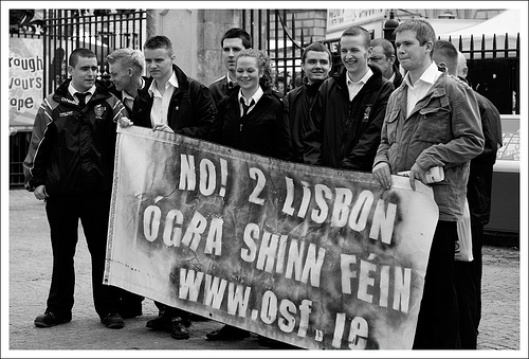
Europe in Search of Itself
Published on
Economic, constitutional paralysis… Europe is going through a difficult period. But Eli Barnavi in his essay, L’Europe frigide (Frigid Europe), turns back to the basic problem that haunts the European Union: its identity crisis.
 Eli Barnavi’s ambition when it comes to dealing with the question of Europe’s paralysis is simple: “Understanding the nature of the problem is already half of the solution.”
Eli Barnavi’s ambition when it comes to dealing with the question of Europe’s paralysis is simple: “Understanding the nature of the problem is already half of the solution.”
Doted with a point of view that is, exterior (the author is Israeli) and, at the same time, intimate (his experiences in European diplomacy and his knowledge as a historian), the author considers himself to be franc and unrestrained. The title L’Europe frigide, like the writing style, is indeed striking.
While highlighting the merit of the European experiment and its success, he points to its defects without hesitations. Much more than frigid, the Union seems blind: it does not see what the French and Irish refusals of the referendums are expressing. Looking beyond the more or less justifiable reasons of these refusals, they are facts that can no longer be ignored or treated with contempt. They manifest the European project’s inadequacy and its current impasse.
The main idea of Barnavi’s work is that this impasse is culturally motivated. Europe, as a community regrouping different autonomous states, must construct an alliance based upon a re-appropriated History, a common culture and upon strong symbols. The European mystique has to re-invented.
Redefining the European identity
To accomplish such a feat, it is necessary for Europe to know and be conscious of it’s own identity. Yet, the haze surrounding the questions of borders, adhesions and possible candidatures shows how much Europe does not understand itself.
From a (very) rapid depiction of the great periods which shaped the continent, those that are retained are the successive influences of Greece for its introduction of art, philosophy and politics, of Rome and the invention of the law and of citizenship, of the barbarians and their feudal hierarchy based on a contract and, finally, of the Church, in particular for its concern in the transmission of knowledge. In this way the polemic surrounding the Christian roots of the Union is put to an end. “An intelligently conceived pedagogy of Europe can and must be inclusive without being exclusive.”
Acknowledging this part of History means that the idea of secularity would not be questions and the wires of immigrants who have become French would not be alienated. Within the framework of this long History, European values were born: the precedence of rationality (the famous “daring to think” of the Enlightened), secularity, solidarity and, strongly related to this, equality. With all the problems that this poses, problems of competition, in particular between equality and freedom as Tocqueville has shown so well. But up to here, nothing surprising, if not for the clear reminder of these values.
The error of expansion without introspection
More interesting is the author’s refusal to admit diversity as a value and to reduce it to a simple fact. Diversity is precisely the opposite of a union that should be in the centre of European pedagogy. “What Europeans need is not so much an exaltation of their difference but to be shown what they have in common.” Once it discovers and rediscovers it’s history and also its geography, Europe must dare to pose strict limits to its extension. For Eli Barnavi, Europe is neither Russia nor Turkey, which is being treated irresponsibly by Europe’s acceptance of it’s impossible candidature, according to the author.
Expansion without introspection is a serious error. “The values of Europe to want to embrace the world, is to condemn European politics to death” and to give it up to the Treaty of Rome.
Simple proximity should not generate adhesions but co-operations with variable geometry. This, Europe must apply on its territory and its identity.
Regaining self-confidence and taking action`
In practical terms this means regarding immigration as a mutual contract of obligations. Including the respect of the European values on behalf of the immigrant. The Anglo-saxon multicultural model has failed to accomplish its goal of integration and must be re-examined to establish a “tolerance level, as Mitterand would have put it. To regain self-confidence is also to put a stop to the laissez-faire attitude between the States of the union: the author insists that in its current form the Union is like a club without rules.
For the sake of coherence and efficiency, Europe needs to impose strict rules and to really sanction breaches. Today, Europe’s passivity is reduced to absurdity: “they are spitting on Europe’s face and it observes with a contrite smile that it is raining.”
To remedy the situation, the author proposes to impose a temporary system of exclusion. For once, at least on paper, someone has dared to express the idea. On a much smaller scale—to take responsibility is to finally act in a clear and coordinated manner on the international scene.
Surpassing the colonial guilt and acting responsibly
Taking up the fashionable arguments, Eli Barnavi virulently criticises Europe who has become “a culture of self-flagellation.” He urges Europe to surpass its colonial guilt and to act responsibly. Without falling in the trap of dubious neocolonialism, it is possible to carry out targeted development projects that take into account all sides of the problem, that respect the integrity and the autonomy of each country. Europe is deluding itself believing its particularity concerning international settlements.
For the essayist, Europe’s refusal of unilateralism in the American way is but a manifestation of its weakness and its self-imposed inability to take centre stage. However, a return to this Europe appears to be possible, with discipline during a period when America “an exhausted Atlas” is in crisis. The urgency is thus to restore a defensive Europe that exceeds the state interests, to speak out loudly and with a unified voice: “ A Europe which acts on the international scene in a disorganized manner is a Europe that does not count.” The fiasco that was the European response to the war on Iraq is a striking proof.
A book lacking in ambition
Through out this succession of observations, Eli Barnavi’s project becomes very clear: to demonstrate his pedagogical capabilities and to analyse the European identity crisis point by point. It is, at the same time, what makes the book interesting and it’s weakness. The scope is so broad and complex that the relevance of the book is hindered by its rapid treatment. At times, the global picture grazes caricature, like when he depicts the portrait of a wild global economy: “ these overexcited traders, coked up, playing the game of finance on their computer screens like our children in war who have no understanding of their actions.” Formulaic expressions also have their shortcomings…
Is it not possible to awaken the consciousness of the contemporary reader in another way aside from vague and provocative language? And, can’t they read an essay that is more than 150 pages?
Alice Lemaire
Translated by Joanna Cordero
Picture : Tiago Menezes/FlickR



